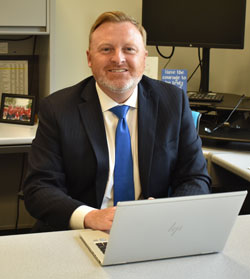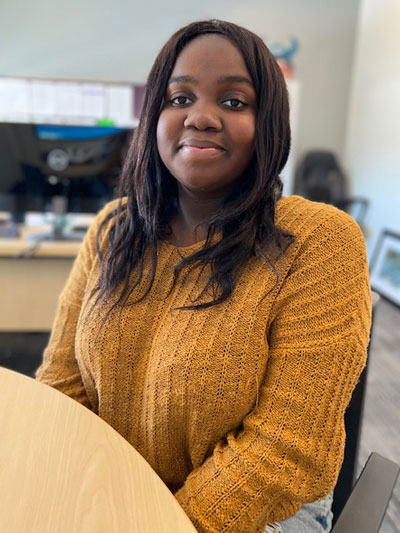Grand Rapids, Wyoming — Juliet may have mused: “What’s in a name? That which we call a rose by any other name would smell just as sweet.” But local educators say there’s power in words that can impact how young people feel about themselves.
Over the past two years, Grand Rapids and Wyoming Public Schools have begun referring to students as “scholars.”
And there are reasons behind the shift.

“Is it just a word? Sure it is, but it (implies) deep and powerful actions,” said Wyoming Public Schools Superintendent Craig Hoekstra. “The word scholar elevates and raises the bar to make sure the words we use match the expectation we have. It’s the mindset; it’s believing in themselves, setting high goals, perseverance and grit.”
It’s an effort to help children shape who they are when they walk into their school buildings and to envision what they can be, said Wyoming Junior High School Principal Alex Schukow.
“We want all of our students to have such a positive experience as a student in our building,” he said. “When we use the term ‘scholar’, it’s really a term of hope and empowerment and it communicates our high expectations and our belief in their greatness and what they are capable of.”
The districts work with Tammy Campbell, former superintendent of Federal Way Public Schools in Washington. She is helping Wyoming with a multi-year effort to improve equity and student success among its highly diverse student population. She also works with Grand Rapids Public Schools, Kentwood and Kent ISD.
Campbell uses the word “scholar” to refer to students, but doesn’t ask educators she works with to do so. Some like it and pick up on it on their own, she said.
“I believe it’s something inspiring for (young people) to think of themselves that way,” she said. “It’s a term of high expectations. … We have big plans for them and we want them to realize it.”

Ron Gorman, assistant superintendent of instructional services for Kent ISD, heard an administrator in Muskegon use the term when he was GRPS deputy superintendent. He then noticed Cambell using it regularly during professional learning sessions. At first it sounded peculiar to him, but now it’s become part of his vocabulary.
“It just started to resonate with me. It was a word that was connected to optimism. It was an aspirational term. In contrast, my assumption is that students haven’t always felt like scholars. Whenever I have the opportunity to uplift, I try to do so.”
He also connects it with having a growth mindset, and a message that, “I see you as a scholar, and therefore you should see yourself as a scholar.”
Thoughts from the Scholars
GRPS and Wyoming High School students’ thoughts and opinions on the change in verbiage range from indifference to curiosity, and being held to higher standards and inclusivity.
“I’ve always been referred to as a student, but if it makes others feel equal, then great,” said Union High School senior Tommy Stevens. “They could continue using the word if it makes everyone feel welcome, but after a while you become desensitized to the energy and excitement of being called a ‘scholar’.”
Tommy thought the term could encourage some to put more effort into their schoolwork. He also said teachers using the term more is a sign of increasing respect and encouragement of all students at Union High School.
‘When we use the term ‘scholar’ it’s really a term of hope and empowerment and it communicates our high expectations and our belief in their greatness and what they are capable of.’
— Wyoming Junior High School Principal Alex Schukow
Junior Terrell Daniels said he thinks of “someone who is going to pursue education beyond high school” when he hears the term “scholar.”
“I started thinking that ‘scholar’ was automatically putting me on the path to college,” he said. “I wasn’t thinking about college in middle school, but now it makes me feel kind of special.”
On the other hand, Terrell predicts that increased use of the word will decrease its value.
“Like how money devalues if you have too much of it: if you call everyone a scholar, it decreases the value of the word,” he said. “Even if the word becomes normalized, it won’t motivate some students. It’s unrealistic to think that everyone can succeed.”
In her first year at a new school, freshman Kellis Keme initially connected the word “scholar” with receiving scholarships for college, then associated it with going to college.

“It was weird to hear at first and it makes me feel old, like beyond my years,” she said. “Now I’m starting to hear it so much it’s losing its meaning.”
Wyoming High junior Alexis Moras said she discussed the change with her peers.
“I have mixed feelings. … For me, I understand “scholar” makes you feel like a higher figure — involved and more important — but then you have to be held to these expectations and this is how you’re seen. … I think some people are like, ‘OK, you’re calling me a scholar, so what?’”
But she also sees that the term could be received positively. “‘It’s like, I’m a scholar. I need to be like this; I need to strive to be better.’”
Wyoming High School junior Symone Gray said the term could be used in a more impactful way.

“I think it has good intentions, but it’s kind of overused and thrown around to the point where it doesn’t feel genuine anymore. It’s just kind of lost in the overusage. Like, if a sign says ‘No scholars past this point’ during lunch, it’s just kind of laughed at. But if it was used in a different way, like, more academically related, I think people would take it more seriously and be more genuine in how they feel about it.”
But she did see how it can have a powerful impact.
“I think it’s important to encourage your students to think past the point of what they believe they can do, but it all kind of depends on the people. If they already feel that way about themselves they aren’t going to take it seriously, but it can have a positive effect on people that do not see that in themselves.”
Alexis Stark contributed to this article.









